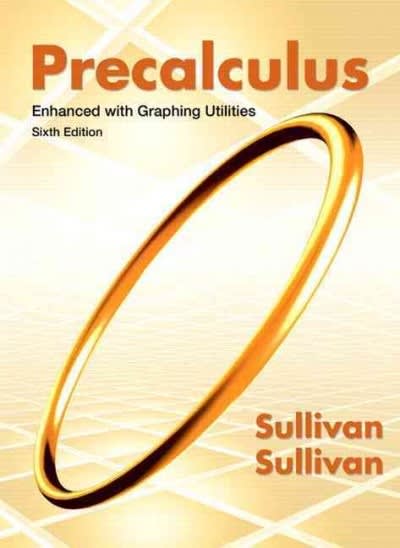Question
1. A function f(x) is defined as: (0.5 x^2) if x < 1 , and (-2) if x = 1 , and (3 - x)
1. A function f(x) is defined as: (0.5 x^2) if x < 1 , and (-2) if x = 1 , and (3 - x) if x > 1 . Which statement is false about this piece-wise defined function?
a) The function f(x) is defined for all values of x.
b) The function is discontinuous.
c) The value of the function at x = 4 equals 8.
d) The function has a jump discontinuity at x = 1 .
e) The graph of the function passes through the point A(5 , - 2 ).
2. Given the exponential equation (9/4)^(x+3) = (8/27)^(-5) , the exact value of the square root of the equation's single root equals:
a) 2 (2 ) / 3
b) 9 (2 )
c) (2 )
d) (2 ) / 2
e) 3 (2 ) / 2
f) - 2 (2 ) / 3
g) 4 (2 )
h) None of the given options are correct.
i) - 3 (2 ) / 2
3. If the common logarithm of x , that is log x equals 8, then the logarithm of (x^2) to the base 0.1 equals:
a) -1
b) 10
c) 1
d) - 24
e) - 4
f) - 16
g) 80
h) 0.8
i) - 8
j) 8
k) 16
l) - 32
4. Given that p = 5 q , the value of [log (p)^(-1) - log (q)^(-1)] correct to 3 decimal places equals:
a) - 0.278
b) - 0.2
c) - 2.796
d) 5
e) 2.796
f) 1.398
g) - 1.398
h) 0.699
i) 0.278
j) 0.2
5. Which one of the following numbers equals to the common logarithm of R, that is log (R), given that 3 ^ [ log(1/R)+(1/2) log(1/10000)] = 1 / 81 ?
a) 10000
b) - 4
c) 1
d) 100
e) log(4)
f) 0.25
g) 4
h) 0.1
i) -0.01
j) 0.25 log (4)
6. When the polynomial (2a^3 - 7a + 6) , is divided by the binomial (7a - 4), the remainder is:
a) 343/814
b) 814 / 343
c) 407 / 343
d) 343 / 407
e) - 343 / 407
f) - 407 / 343
g) - 814 / 343
h) - 343/814
i) 37821 / 1184
j) -37821 / 1184
k) None of the given options are correct.
7. The binomial (x^2 - 3x - 4) is a factor of the cubic polynomial (x^3 - 6 x^2 + m x + n), where m and n are integers. The value of (m+n) equals:
a) 7
b) 5
c) 12
d) 17
e) 8
f) - 7
g) - 5
h) 18
i) 3
8. Which one of the following is NOT an exact root of the equation x^4 - 8 x^3 + 13 x^2 = 18 - 12x ?
a) 1
b) 2 + 25
c) 3
d) 2 - 10
e) All of the given options are the roots of the equation.
9. The sum of the periods of the functions y = 4 tan (16 x) and y = 16 cot (4 x) equals 5 / 8 .
a) True
b) False
10. A quartic function f(x) = x^4 has undergone some transformations and its equation has become g(x) = 3(x+6)^4 - 48 . The average (arithmetic mean) of ALL zeros of this quartic function equals:
a) 6
b) - 2
c) 8
d) None of the given options are correct.
e) - 6
f) - 8
g) 0
h) - 4
i) 12
j) 32
Step by Step Solution
There are 3 Steps involved in it
Step: 1

Get Instant Access to Expert-Tailored Solutions
See step-by-step solutions with expert insights and AI powered tools for academic success
Step: 2

Step: 3

Ace Your Homework with AI
Get the answers you need in no time with our AI-driven, step-by-step assistance
Get Started


